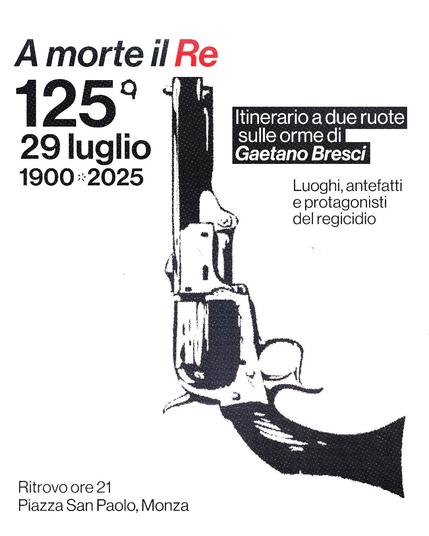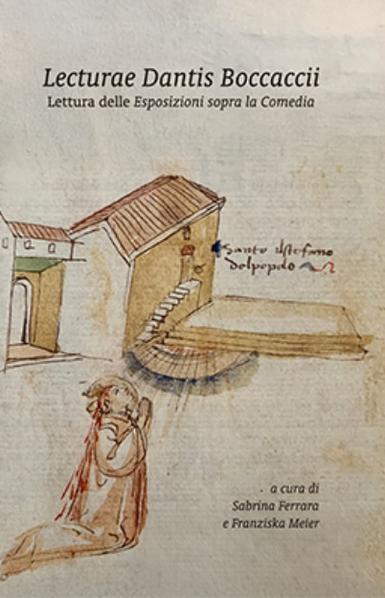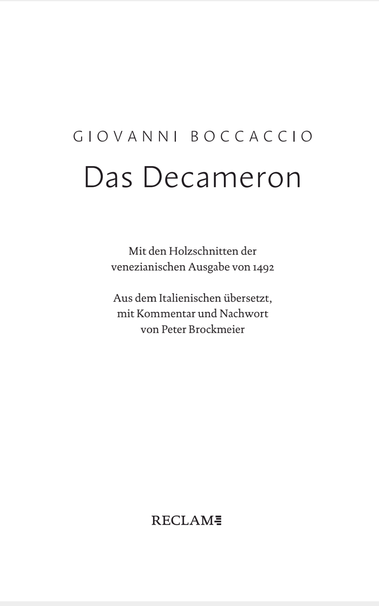Giovanni #Boccaccio: Franziska #Meier auf #Spurensuche nach dem #Autor des berühmten #Dekameron“
https://www.l-iz.de/bildung/buecher/2025/09/giovanni-boccaccio-franziska-meier-spurensuche-autor-beruhmter-dekameron-635080
#Rezensionen #Bücher #Biografie #Literaturgeschichte #Decamerone
#Boccaccio
Gerade erschienen 😍
Die unglaubliche Leichtigkeit eines schweren Autors, oder: #Calvino liest #Boccaccio
https://www.chronos-verlag.ch/node/28958
@fidromanistik @romanistikde @avldigital @italianstudies @renaissance @bookstodon
A morte il Re! Edizione 2025
Martedì 29 luglio, dalle 21:00 alle 23:00, presso Monza, Stazione Fs, p.zza Castello; e anche online, su https://boccaccio.noblogs.org/post/2025/07/23/a-morte-il-re-edizione-2025/
Martedì 29 luglio 2025
125° anniversario del regicidio
A MORTE IL RE
Itinerario a due ruote sulle orme di Gaetano Bresci.
Luoghi, antefatti e protagonisti del regicidio.
Ritrovo ore 21, piazza San Paolo, Monza.
La biciclettata si concluderà presso la Cappella Espiatoria.
In caso di maltempo l’iniziativa non avrà luogo.
*************
“A morte il re” è un itinerario in bici che vi condurrà in sei tappe per la città di Monza alla riscoperta di luoghi e fatti storici correlati all’uccisione di Umberto I da parte di Gaetano Bresci. Dalla strage di piazza San Paolo del 1898 fino ai tre colpi di Bresci, una voce narrante e letture tratte da testimonianze dell’epoca ricostruiranno gli avvenimenti e le loro ragioni storiche. Un’occasione per immergersi n
Die Handschrift des Monats Juli 2025: Die Moral von der Geschicht' – Giovanni Boccaccio über berühmte Männer und Frauen (Cod. 168)
#Humanismus #Boccaccio #FrüheNeuzeit #berühmt #Handschrift #Handschriftenabteilung #Dombibliothek #Bibliothek
[2025-07-03] SENZA CHIEDERE PERMESSO LUGLIO 2025 @ Parchetto https://balotta.org/event/senza-chiedere-permesso-luglio-2025 #Senzachiederepermesso #gentrificazione #autogestione #repressione #chiacchera #Boccaccio #bolognina #mercatino #concerti #monza
SENZA CHIEDERE PERMESSO LUGLIO 2025
Parchetto, giovedì 3 luglio alle ore 17:00 CEST
Giovedì 3 luglio ventunesima edizione del Mercatino autogestito del riuso e delle autoproduzioni!
🏴☠️ Dalle 17 allestimento, birrette fresche e microfono aperto! Musichette con i Bassdicted: frequenze jungle e drum n bass contro la repressione.
⚓ Dalle 20:00 chiacchierata con i compagnx del Boccaccio: processi di riqualificazione urbana tra Monza e la Bolognina. Storie di lotte e territori, sgomberi e repressione, autogestione e resistenza. Quali prospettive davanti al Nulla che avanza?
🖤 A seguire cena per sostenere il collettivo Boccaccio e i compagnx colpitx dalla repressione a Monza.
🧨 Drink e intrugli benefit prigionierx
💥 Dalle 22 esplosivo tekno-punk MI/MB con i Filthy Generation.
😈 Fino a chiusura si balla con Uncle dj
“Senza una rottura violenta con l'abitudine nessun cambiamento è possibile”
Più info qui: https://mercatinoautogestito.noblogs.org/post/2025/06/23/senza-chiedere-permesso-luglio-2025/
https://balotta.org/event/senza-chiedere-permesso-luglio-2025
NEW: Lectura of #Boccaccio|s commentary on Dante's INFERNO
@avldigital @fidromanistik @fidromanistik @italianstudies @renaissance
Conference on #Boccaccio #DeCasibus at #Tours
🍾🍾🍾 Voilà: the International #Boccaccio Edition’s (IBE) homepage
@italianstudies @renaissance @fidromanistik @romanistikde @neolatin @avldigital
Dagli albori della #letteratura, là dove si parla di #amore si annida anche un briciolo (o più) di follia.
Non è da meno la narrativa breve medievale e moderna, dove, dalle novelle di #Boccaccio a quelle di #Cervantes, l'irrazionale irrompe nel tema amoroso, con le varie forme della follia: dal tragico al comico, dal drammatico al grottesco.
Per scoprirne di più scaricate qui il volume in #OpenAccess 🔗 https://riviste.unimi.it/index.php/carteromanze/issue/view/1472?mtm_campaign=mastodon
Giovanni #Boccaccio died #otd 1375. One of the greatest writers of all times. #earlymodern prepare for next year!
Next week: #Zürich Lecture in #MedievalPhilology on #Calvino and #Boccaccio
https://www.ds.uzh.ch/de/seminar/abteilungen/aeltere/lectures_in_medieval_philology.html
Just out — #Boccaccio’s early modern reader-response criticism https://drive.google.com/file/d/1F_YgQruq4vAuN_fj2FP4SiG2lg4YGK_E/view?usp=drivesdk
原来sei(essere的第二人称单数)这个写法是十六世纪才有的
【所以早期文本里出现的se'(它的省音版)是不应该有的,现在认为应该统一修改成撇号在字母上面的形式。】
“Love In My Pocket”: How Using Modern, Accessible Language Connects Contemporary Audiences with Timeless Ideas
Preface: I was listening to one of my favorite songs, “Love in my Pocket” by Rich Brian, this morning, when I conceived a shitpost idea about an imaginary essay on this very thing. I posted the shitpost (which I’ll include a screenshot of below). I knew I would probably get at least one person jokingly asking “where’s the essay, OP??”, in the comments. So I decided that even if no one asked, I would give them the goddamned essay whether they wanted it or not, because I am bored and miss writing essays. I also love this song. It will likely be genuinely academic in nature but conversational in tone, with direct links to citations rather than a formal bibliography because I’M TIRED. However, if this genuinely attracts attention, I will go back and make a formal bibliography. So, without further ado, here’s the essay.
The shitpost in question.“Love In My Pocket”: How Using Modern, Accessible Language Connects Contemporary Audiences with Timeless Ideas
When you hear a modern pop song or hear young adults making jokes or talking politics on social media, what is your first reaction? Do you scoff and think, “ugh, people these days can’t write anymore?” Don’t worry, gentle readers. I used to react that way, as well, before I realized that these modern writers and jokesters have a lot in common with master writers of old such as Chaucer and Boccaccio. Now, you’re probably thinking, what these could the catchy songs full of modern language you hear on YouTube and TikTok, teens discussing big ideas on social media, and masterworks of the late Middle Ages and early Renaissance such as the Canterbury Tales and the Decameron possibly have in common? I’m glad you asked. I’m going to put it all together for you, gentle readers, but first, you need some historical context.
For centuries after the fall of the Roman Empire at the hands of Odoacer in 476 AD, the only semblance of law, order, and knowledge in Europe came at the hands of the Roman Catholic Church. The Church kept Latin alive in their services and texts, and it became the language of the rich and educated. Much of the poor population never learned to read in their mother tongues, much less Latin, as before Johannes Gutenberg brought the printing press to Europe around 1440, books were painstakingly written and copied by hand in monasteries and were prohibitively time consuming and expensive to make. As a result, knowledge, and therefore power, was almost exclusively in the hands of the wealthy and powerful and entirely outside of the hands of the lower classes. This created a system of government known as feudalism, with the Pope, the head of the Church, as the most powerful force in the land, the kings subservient to him, various lords and knights subservient to the kings, clergy to enforce the Pope’s will, and an entire set of classes of people beneath all of them who couldn’t own land, who were the property of the lords, and were deliberately kept from knowledge so that they could be easier to control. Is any of this starting to sound familiar to you, dear readers? Does it perhaps resemble our modern system? Don’t worry, I’m getting to my point.
All of this started to change when a few things happened. First, there was a devastating pandemic that swept through Europe that became known as the Black Death. A particularly nasty strain of the bubonic plague that was transmitted initially by infected flea bites, it quickly hopped from fleas to rats that had stowed away on Asian ships that were on their way to besiege key European ports, to the infected corpses themselves that were then used as biological weapons against the besieged ports.
The Black Death then swept through Europe, killing millions and causing an enormous labor shortage. The surviving peasants quickly realized that they had an advantage over the surviving landowners, and banded together to form guilds to leverage their skills and collectively bargain for better wages, treatment, and power. This tactic worked, as the landowners really had no defense against the peasants at this point, as everyone they knew was dead, there was no one left to back them up, and they had to bargain with the guilds to get anything done. The guilds then enabled the peasants to get rich and powerful for the first time in centuries of European history, giving rise to what is now known as the middle class as they soon got wealthy enough to own land of their own without the previous requirement of a title. Welcome to the early Renaissance, people.
Then, something else happened. Remember that Gutenberg guy? He was a goldsmith and he wanted to make books faster and easier to make. Improving on screw presses already available, he made a commercially viable movable type printing press around 1440. Boom. Books. Books galore. Now the people didn’t have to copy books by hand. They could simply print them and they were in business.
However, that wasn’t the only interesting thing happening. The common people weren’t just interested in breaking away from the lords. They were giving the Church the finger, as well. Remember, many people didn’t understand Latin, the language of the rich and educated. So they figured, “We’re not clergymen or princes. Why should we write in Latin?” When these mass produced books started coming into fashion, people started writing in their local language about what was going on around them. This phenomenon is called “writing in the vernacular”.
Two very popular stories at the time that the common people connected with were about people hanging out in the Black Plague and written in the common people’s respective vernacular. One, written in the form of English spoken at the time, was the Canterbury Tales, written by the poet, diplomat, and civil servant Geoffrey Chaucer from 1387 to 1400. It technically predates the printing press by about 40 years, but it’s bawdy, it’s sad, it’s high drama for the ages. It connected the common people with themes that they could relate to in language they could understand and it entertained them during a very dark time.
Another, the Decameron, was written in Italian by Italian author Giovanni Boccaccio, for Italians. It’s another high drama vernacular story intended to completely make fun of the city-state of Florence in a wickedly black comedy style and tone. Yet again, the vernacular connected the people of the time with ideas they resonated with using accessible language with a healthy dose of dark humor and wit.
Similar things are happening today. We may not have a printing press, but we saw similar things happening during the COVID-19 pandemic lockdowns with people connecting on apps such as TikTok over people, topics, and music, in a format and language that was accessible to them for perhaps the first time in their lives. They were learning and connecting in their vernacular, just as the peasants did with literature written in their vernacular hundreds of years prior during the Late Middle Ages and Early Renaissance.
Much of academia and literature is written and taught to young people in a way that is inaccessible to them, and many educators don’t know, don’t care, or do not have the means to connect with their students, as the public school system in the United States is ill equipped to prepare students to be anything different than the modern equivalent of the peasants of the Middle Ages, and teachers are burnt out and exhausted.
Therefore, I would argue that modern music that uses language that is accessible to the young people of today is no different than the authors of the early Renaissance who wrote in their local vernacular, and they are following in that proud, rebellious tradition. An excellent example of an artist who connects with his audience using modern vernacular is the singer and social media star Rich Brian. He was discovered via various social media platforms, and his music took off. He blends shock, awe, comedy, relatable themes and lyrics, and catchy hooks to create a distinct sound that sounds like he’s having fun. He has made mistakes in creating a name for himself just like any human being, but has apologized and taken accountability for those mistakes. He’s also an immigrant and overall I love his music and his story.
Take his song “Love in My Pocket,” for example. When he sings, “I’ve got love up in my pocket, and I don’t know what to do with it,” he is making the concepts of unrequited love and grief accessible to a modern, common audience just as the early vernacular writers of the Renaissance did when they stopped writing in Latin and started writing in their native tongues.
In conclusion, the next time you’re tempted to scoff at modern popular music and social media culture, ask yourself what themes these creators are trying trying to convey to their audience in the artist’s (and the audience’s) vernacular instead. Unrequited love? Grief? Wonder? Anger? Language changes and the way information is shared changes, people, and writing in one’s own vernacular as well as the free spread of information itself is a proud, rebellious tradition that helps the common people break free from oppression and fear.
QED, or as they would say in the modern vernacular, mic drop.
Stay tuned for more magic, people. I love y’all immensely. ✨
Your now very brain fogged sorcerer (I chugged a Red Bull to make this essay happen), Lazarus.
Subscribe to Blog via Email
Enter your email address to subscribe to this blog and receive notifications of new posts by email.
Email Address
Subscribe
#Boccaccio #CanterburyTales #Catholicism #Chaucer #christofascisn #declineAndFallOfRome #education #essay #freedom #IMissWritingEssays #IMBored #JohannesGutenberg #MiddleAges #oppression #printingPress #publicSchools #serfdom #TikTok #vernacular #worldHistoryISMyRomanEmpireGoddamnit #writingInTheVernacular
Next event #Boccaccio|s (digital) library @renaissance @neolatin @italianstudies @fidromanistik @avldigital
Warum in Boccaccios Decameron neben sieben Frauen auch drei Männer mit im Landhaus dabei sind, wo sie sich gegenseitig zehn mal zehn Geschichten erzählen, während in Florenz die Beulenpest wütet? Lest selbst...
#books #buch #bookstodon #boccaccio #decamerone #renaissance #feminism
Dekameron von Giovanni Boccaccio: Eine Netflix-Adaption https://www.lesering.de/id/4915370/Dekameron-von-Giovanni-Boccaccio-Eine-Netflix-Adaption/ #MeisterwerkderWeltliteratur #Literaturverfilmung #Literaturverfilmung #MichaelUppendahl #CinecittàStudios #14.Jahrhundert #KathleenJordan #BoccacciosWerk #Netflix-Serie #TheDecameron #LustundMoral #Boccaccio #Dekameron #Verbot
MONZA: SGOMBERATO IN MENO DI 24 ORE IL NUOVO FOA BOCCACCIO. 7° SGOMBERO IN POCHI MESI https://www.radiondadurto.org/2024/06/22/monza-sgomberato-in-meno-di-24-ore-il-nuovo-foa-boccaccio-7-sgombero-in-pochi-mesi/ #foaboccaccio #occupazione #boccaccio #sgombero #monza #News





![ohne die Lenkung eines Mannes miteinander umgehen und sich auf- führen. Wir sind launisch, widerspenstig, argwöhnisch, verzagt und ängstlich. Deswegen bezweifle ich sehr, ob sich unsere Gesellschaft, falls wir uns allein unserer eigenen Führung anvertrauen, nicht bald und weniger ehrenvoll als notwendig auflösen würde; also sollten wir hierüber nachdenken, bevor wir uns aufmachen." Darauf sagte Elissa: "In der Tat sind die Männer der Kopf der Frauen und ohne ihre Entscheidung bringen wir nur selten eines unserer Unternehmen zu einem lobenswerten Abschluss. [...]"](https://files.mastodon.social/cache/media_attachments/files/113/137/572/417/481/691/small/5ef36afdbbb47e79.png)